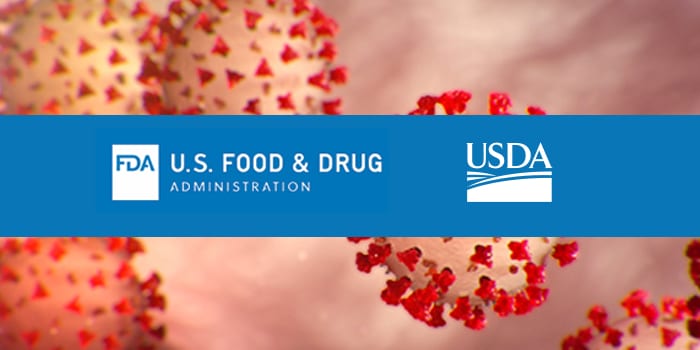The Food and Drug Administration (FDA) on Friday released temporary guidance to allow food manufacturers to change ingredients without updating product labels, a move aimed at preventing supply chain disruptions during the COVID-19 pandemic. In response, company and industry leaders are speaking up to promote consumer safety.
In an email, a FDA spokesperson said that many food brands have reported COVID-19-related supply chain disruptions or shortages for some ingredients, thus requiring formulation changes. The agency did not provide further details on which specific products or categories have been experiencing ingredient issues, other than noting a shortage of the bleaching agent used for bleached flour. The FDA said a number of manufacturers asked for flexibility to avoid slowdowns in producing and distributing some foods, and that the guidance may be extended beyond the pandemic as supply chains readjust.
“Our goal is to provide regulatory flexibility, where fitting,” the guidance notes. “As a result of the COVID-19 pandemic, the food industry has informed us that there are supply disruptions or shortages for some ingredients and, as a result, manufacturers will need to make formulation changes, such as omissions or substitutions of minor ingredients.”
According to Carey Allen, associate managing director of supply chain food safety at product certification organization NSF International, the FDA’s main goal is to accelerate the process by which labels are updated, which can typically take weeks or months. The guidance notes that substitutions should comprise 2% or less of the finished food and not be a “characterizing ingredient,” such as raisins in raisin bread. A substitution should pose no known “adverse health effect,” and brands are advised to avoid adding ingredients among the top eight allergens and “priority allergens” including sesame, celery, lupin, buckwheat and molluscan shellfish, as well as glutamates and sulfites. An ingredient change shouldn’t impact nutrient content, health claims or functionality, the FDA added.
“Manufacturers should avoid substitutions that could result in a safety concern without making a conforming label change or providing other means to inform consumers of the change,” the guidance reads.
For example, the FDA is allowing flour companies to produce unbleached flour in packages that say ‘bleached.’ While printing new labels is “most desirable,” the agency recognizes that may not be possible during the pandemic.
“For transparency and consumer awareness, we recommend alternative ways, such as posting information to their website or through point of sale labeling, to communicate to consumers any changes,” the guidance notes. The guidance noted some existing flexibility in food packaging: spices can be swapped and labels can still simply list ‘spices,’ for example.
Some brands, consumers and industry groups have criticized the guidance for posing further risks to allergy sufferers. Advocacy organization Food Allergy Research and Education (FARE) sent a letter to the FDA yesterday demanding an “immediate revision.”
“We ask the FDA to require food manufacturers to inform consumers of any changes via their website and social media channels [and] require labeling alternatives like stickers, alerts within online shopping sites or signage at retail,” FARE CEO Lisa Gable wrote. “By disclosing the changes and sharing them broadly, food manufacturers and the FDA will regain the trust of the food allergy community.”
According to FARE, the 32 million Americans living with potentially life-threatening food allergies have met challenges during the pandemic with short supplies of allergen-free foods. The letter includes some of the hundreds of comments FARE received about the new guidance.
As consumers expressed frustrations, many brands took to social media to prevent muddying their own clean-label promises. In a LinkedIn post, seed brand 88 Acres ensured label accuracy, while allergen-free baked goods brands Good Molly’s and Partake Foods emphasized that ingredient swaps would not happen.
“We will never do that,” Good Molly’s CEO Molly Hamilton wrote on Instagram. “When we launched, it wasn’t to do what other brands were already doing or to meet minimum government guidelines. It was to do things better, with transparency, accountability, and with ingredients you can trust.”
Trish Thomas, co-founder and CEO of allergy-friendly brand Every Body Eat, encouraged companies to use stickers, even if it’s expensive, adding that allergies are a “really layered, complicated issue,” with many people unaware they have them.
“Loyal customers will appreciate that more than a trip to the hospital,” she said.
Spokin, an app to manage food allergies, launched a brand verification program this year for brands that are free from at least one of the top eight allergens. When founder and CEO Susie Hultquist contacted the app’s 37 verified brands on Sunday to commit they won’t change their products, half responded within 30 minutes.
“We’re raising the standard ourselves,” Hultquist said. “We can’t predict regulations; to me this [guidance] doesn’t feel pro-consumer or pro-transparency — it feels like the opposite.”
During a pandemic or not, brands need to be as honest as possible, Allen advised. When a formulation change occurs, manufacturers must notify NSF International to reevaluate a product for its various certifications. Despite any regulatory guidelines, the onus of responsibility falls on the manufacturers, she said, who should consider any risk factors for the end use of a product.
“What are the things the consumer looks at for making a decision on a product?” she said. “The value of the product might drive how they intend to communicate what that is. [The guidance] allows for timeliness in the short term, [while] still holding the industry accountable for making the right decisions.”
